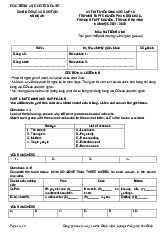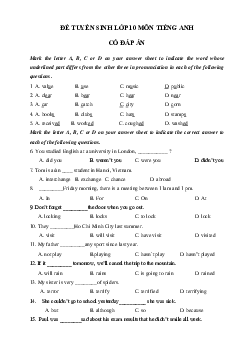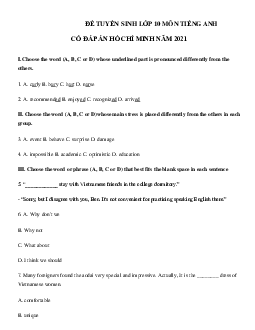










Preview text:
SỞ GD – ĐT THÀNH PHỐ
KỲ THI TUYỂN SINH VÀO HỒ CHÍ MINH LỚP 10
ĐỀ THI THỬ SỐ 6 Thời gian làm bài: 90 phút
Họ và tên học sinh: ................................................................................
I. Choose the word with different pronunciation from the others (0.5 pts)
1. A. mosque B. optional C. notice D. tropical
2. A. different B. difficult C. invite D. visit
II. Choose the word whose stress pattern is different from that of the others (0.5 pts) 3. A. Buddhism B. climate C. comprise D. friendliness
4. A. compulsory B. correspond C. impress D. divide
III. MULTIPLE CHOICES: Read and choose the appropriate
word or phrase (2.0 pts)
5. In London the _______________ of people live in the suburbs. A. kind B. aspect C. majority D. priority
6. They usually grow cereals in the east _______________ England. A. in B. of C. on D. from
7. Wearing uniforms _______________ students to be proud of their school. A. expected B. warned C. advised D. encourages
8. Some of us slept very soundly _______________ it was so peaceful and quiet there. A. so B. because C. but D. although
9. Most of this _______________ comes from the land, which means it comes from people. A. pollution B. natural disaster C. traditional festival D. collection
10. I _______________ to her party last night. A. invited B. was inviting C. was invited D. have been invited
11. Peter didn't live with his parents so he learnt _______________ after himself. A. look B. to look C. looking D. to looking
12. Tropical forests also reduce _______________, keep the water
clean and slow down the Greenhouse Effect. A. flood B. drought C. solar energy D. pollutants
13. - "My mother is ill in hospital." - "_______________." A. I don't think so B. Oh, she is unlucky C. No problem
D. I'm sorry to hear that
14. - "Shall we go boating tomorrow?" - "_______________. The
weather report says a storm is coming." A. Sure B. That's a deal C. That's a good idea D. I'm afraid we can't
IV. CAUTION SIGNS (0.5 pts) 15. This sign says: A. No trucks allowed.
B. No passing zone for trucks.
C. Trucks must yield to other vehicles. D. Hill ahead.
16. What does the sign mean?
A. Construction zone ahead. B. Hospital ahead. C. Roundabout ahead.
D. Railroad crossing ahead.
V. Choose the word (A, B, C or D) that best fits the blank space
in the following passage (1.5 pts)
(17)__________ many people the language of the Internet is
English. “World, Wide, Web: Three English Words” was the name of
an article by Michael Specter in the New York Times a few years ago.
The article went on to say: “If you want to take full advantage of the
Internet, there is only one real way to do it: learn English.”
In general, it is not difficult (18)__________ to use Internet
services. (19)__________ Internet services are rather easy to use, you
will have considerable difficulties if you are not familiar with English.
In fact, a good knowledge of English is one of the most important
(20)__________ that help use the Internet. Learning to use a new
Internet service may take a few hours, a few days or some weeks, but
it takes years to learn a language so that you can use it fluently and
(21)__________. Of course, when you know some English, you can
learn more just by using it on the Internet. But (22)__________ your
English should be good enough to understand commonly used words
and to know what to do on the Internet. 17. A. About B. For C. From D. By 18. A. learn B. learning C. to learning D. to learn 19. A. Since B. Despite C. Although D. But 20. A. aspects B. problems C. language D. experiences
21. A. terribly B. hardly C. dependently D. confidently 22. A. at last B. at least C. at first D. at all
VI. Read the passage and choose TRUE or FALSE (1.5 pts)
Air pollution occurs when wastes dirty the air. People reduce most
of the wastes that cause air pollution. Such wastes can be in the form
of gases or particles of solid or liquid matter. These substances result
chiefly from burning fuel to power motor vehicles and to heat
buildings. Industrial processes and the burning of garbage also
contribute to air pollution. Besides, there are other polluting substances
that exist naturally in the air. They include dust, pollen, soil particles
and naturally occurring gases.
The rapid growth of population and industry and the increasing
use of automobiles and airplanes have made air pollution a serious
problem. The air we breathe has become so filled with pollutants that
It can cause health problems. It also harms plants, animals, building materials, and fabrics.
Answer: TRUE or FALSE 23. Air pollution happens when wastes dirty the air.
24. The natural existence of oxygen in the air contributes to air pollution.
25. Vehicles, garbage and industrial processes are natural pollutants. 26. The air with pollutants can cause health problem.
Read the passage again and choose the best answer.
27. What has made air pollution a serious problem?
A. The rapid growth of population B. The increasing use of automobiles
C. The rapid growth of industry D. All are correct
28. What does the word "It" in the last sentence refer to? A. The polluted air B. The health problem
C. The burning material D. The plant and the animal
VII. Supply the correct word form (1.5 pts)
29. Our _______________________________ must be modernized. (produce)
30. ___________________________ from kimono or hanbok, Ao
Dai is worn in many occasions. (difference)
31. _____________________________ believe there are more than
350,000 species of plants, but no one knows for certain. (science)
32. Pompeii was completely _______________________________
in AD 79 by an eruption of Mount Vesuvius. (destruction) 33. Nowadays most
__________________________________________ waste isn't treated safely. (industry)
34. I'm very __________________________________ because
people use electricity to catch fish. (worry)
VIII. SENTENCE TRANSFORMATION (2.0 pts)
35. The students can't go camping.
→ The students wish _____________________________________
36. My father said to me, "I will have a mechanic check your car."
→ My father told me _____________________________________
37. Why don't you decorate your house for Tet?
→ I suggest that your _____________________________________
38. I advise you to speak English in class.
→ If ___________________________________________________
IX. REARRANGEMENT (0.5 pts)
39. good behaviors / on / The monitor's / make / the class members / a deep impression / all /. //
→ The monitor’s ________________________________________
40. underwater earthquake / by / is / caused / or volcanic eruption /
Tsunami / a very large ocean wave /. //
→ Tsunami _____________________________________________ ĐÁP ÁN
Choose the word (A, B, C or D) whose underlined part is pronounced
differently from the others.
1. A. mosque /ɒ/ B. optional /ɒ/ C. notice /əʊ/ D. tropical /ɒ/
2. A. different /ɪ/ B. difficult /ɪ/ C. invite /aɪ/ D. visit /ɪ/
II. Choose the word (A, B, C or D) whose main stress is placed
differently from the others in each group.
3. A. Buddhism /ˈbʊdɪzm/
B. climate / ˈklaɪmɪt/
C. comprise /kəmˈpraɪz/ D. friendliness / ˈfrendlɪnɪs /
4. A. compulsory / kəmˈpʌlsəri/ B. correspond / ˌkɒrɪsˈpɒnd /
C. impress / ɪmˈpres / D. divide /dɪˈvaɪd /
III. Choose the word or phrase (A, B, C or D) that best fits the blank space in each sentence
5. C. majority: Kiểm tra từ vựng: kind (loại), aspect (khía cạnh),
majority (đa số), priority (ưu tiên).
Dịch: Ở London, phần lớn người dân sống ở ngoại ô.
6. B. of: Ta có: in the east/ north/ south of [tên quốc gia]: phía nào của nước nào đó.
7. B. encourage: Kiểm tra từ vựng: expect (dự kiến), warn (cảnh báo),
advise (khuyên), encourage (khuyến khích)
Dịch: Mặc đồng phục khuyến khích học sinh tự hào về trường của mình.
8. B. because: Kiểm tra từ nối
Dịch: 8. Một số người trong chúng tôi đã ngủ rất say vì ở đó rất yên bình và tĩnh lặng.
9. A. pollution: Kiểm tra từ vựng: pollution (sự ô nhiễm), natural
disaster (thiên tai), traditional festival (lễ hội truyền thống), collection (bộ sưu tập).
Dịch: Hầu hết sự ô nhiễm này đến từ đất, có nghĩa là nó đến từ con người.
10. C. was invited: Câu bị động ở thì quá khứ đơn.
S + was/were + V3 + …+ (by O)
11. B. to look: Ta có: learn + to V: học làm gì đó.
12. B. drought: Kiểm tra từ vựng: flood (lũ lụt), drought (hạn hán),
solar energy (năng lượng mặt trời), pollutant (chất ô nhiễm).
Dịch: Rừng nhiệt đới cũng làm giảm hạn hán, giữ nước sạch và làm
chậm Hiệu ứng nhà kính.
13. D. I'm sorry to hear that: Câu hội thoại thực tế. Tỏ sự thương tiếc khi một tin buồn.
Dịch: Bộ phim "Parasite" có được đề cử giải Oscar không?
14. D. I'm afraid we can't. Câu hội thoại trực tiếp. Chọn câu phù hợp với ngữ cảnh.
Dịch: “Ngày mai chúng ta đi chèo thuyền nhé?”
“Tôi e là chúng ta không thể đi rồi. Bản tin thời tiết nói rằng
có một cơn bão đang đến.”
IV. Choose the best answer (A, B, C or D) for the following picture or sign.
15. Biển báo có nghĩa là: A. Cấm xe tải.
B. Khu vực cấm xe tải đi qua.
C. Xe tải phải nhường đường cho xe khác.
D. Dốc phía trước.
16. Biển báo có nghĩa là:
A. Khu vực xây dựng phía trước.
B. Bệnh viện phía trước
C. Vòng xuyến phía trước
D. Đường sắt băng qua phía trước.
V. Choose the word or phrase (A, B, C or D) that best fits the blank
space in the following passage. 17. B. For 18. D. to learn 19. C. Although 20. A. aspects 21. D. confidently 22. B. at least
(17) Đối với nhiều người, ngôn ngữ của Internet là tiếng Anh. “World, Wide, Web: Three English Words” là tên
một bài báo của Michael Spectre trên New York Times vài năm trước. Bài báo tiếp tục nói: "Nếu bạn muốn tận
dụng tối đa Internet, chỉ có một cách thực sự để làm điều đó: học tiếng Anh."
Nói chung, không khó (18) để học cách sử dụng các dịch vụ Internet. (19) Mặc dù các dịch vụ Internet khá dễ sử
dụng, nhưng bạn sẽ gặp khó khăn đáng kể nếu không rành tiếng Anh. Trên thực tế, kiến thức tiếng Anh tốt là một
trong những khía cạnh quan trọng nhất (20) giúp sử dụng Internet. Học cách sử dụng một dịch vụ Internet mới
có thể mất vài giờ, vài ngày hoặc vài tuần, nhưng phải mất nhiều năm học một ngôn ngữ để bạn có thể sử dụng
thành thạo và (21) một cách tự tin. Tất nhiên, khi bạn biết một số tiếng Anh, bạn có thể học thêm chỉ bằng cách
sử dụng nó trên Internet. Nhưng (22) ít nhất tiếng Anh của bạn phải đủ tốt để hiểu những từ thường dùng và biết
những việc cần làm trên Internet.
Câu 18: Câu trúc: It is (not) + tính từ + to V: (không) khó để làm gì…
VI. Read the passage, and then decide if the statements that follow it are TRUE or FALSE.
Air pollution occurs when wastes dirty the air. People reduce most of the wastes that cause air pollution.
Such wastes can be in the form of gases or particles of solid or liquid matter. These substances result chiefly from
burning fuel to power motor vehicles and to heat buildings. Industrial processes and the burning of garbage also
contribute to air pollution. Besides, there are other polluting substances that exist naturally in the air. They
include dust, pollen, soil particles and naturally occurring gases.
The rapid growth of pollution and industry and the increasing use of automobiles and airplanes have made
air pollution a serious problem. The air we breathe has become so filled with pollutants that It can cause health
problems. It also harms plants, animals, building materials, and fabrics.
23. TRUE. Air pollution occurs when wastes dirty the air.
24. FALSE. Besides, there are other polluting substances that exist naturally in the air. They include dust,
pollen, soil particles and naturally occurring gases. (Không có oxygen)
25. FALSE. Such wastes can be in the form of gases or particles of solid or liquid matter. These substances result
chiefly from burning fuel to power motor vehicles and to heat buildings. (Không phải là chải tự nhiên, mà là
do các hoạt động của con người)
26. TRUE. The air we breathe has become so filled with pollutants that It can cause health problems.
27. D. All are correct.
28. A. The polluted air
VII. Use the correct form of the word given in each sentence.
29. Dấu hiệu: Trước chỗ trống có sở hữu cách “our”, do đó chỗ trống phải điền là danh từ số nhiều. Danh từ
phải mang nghĩa “sản phẩm” thì mới hợp ý nghĩa của câu.
Đáp án: products.
30. Dấu hiệu: là động từ thứ hai (động từ thứ nhất là “is”), thay vì đứng sau chủ ngữ “Ao Dai” đã được đưa lên
đầu câu để nhấn mạnh ý. Đáp án: different.
31. Dấu hiệu: Đứng đầu câu, sau chỗ trống là động từ “believe”, do đó chỗ trống là danh từ số nhiều chỉ người. Đáp án: scientists.
32. Dấu hiệu: trước chỗ trống có động từ tobe “was” và trạng từ “completely”, do đó chỗ trống phải là động từ
V3 để tạo thành câu bị động ở thì quá khứ đơn. Đáp án: destroyed.
33. Dấu hiệu: Trước chỗ trống là lượng từ “most”, sau chỗ trống có danh từ “waste”, do đó chỗ trống phải là
tính từ tạo thành cụm danh từ. Đáp án: industrial.
34. Dấu hiệu: Trước chỗ trống có động từ tobe “am”, do đó chỗ trống là tính từ. Đáp án: worried.
VIII. Rewrite each of the following sentences in another way so that it means almost the same as the sentence
printed before it.
35. Viết lại câu thể hiện điều ước không có thật ở hiện tại hoặc tương lai với “wish”
S + wish(es) + (that) + S + V2 +…
Đáp án: The students wish they could go camping.
36. Viết lại câu tường thuật. Quy tắc: lùi thì, đổi chủ ngữ/tân ngữ/sở hữu cách phù hợp.
Đáp án: My father told me that he would have a mechanic check my car.
37. Viết lại câu đề nghị với thể bị động (Vì ngôi nhà không thể tự trang trí được)
S + suggest (that) + S + should + be + V3+ …
Đáp án: I suggest that your house should be decorated for Tet.
38. Viết lại câu điều kiện loại II.
If quá khứ đơn, S + would + V + … (Dùng were cho mọi chủ ngữ)
Đáp án: If I were you, I would speak English in class.
IX. Put the words in the correct order to make meaningful sentences.
39. The monitor’s good behaviors make a deep impression on all the class members.
Dịch: Những hành vi tốt của người giám sát (lớp trưởng) tạo ấn tượng sâu sắc đối với tất cả các thành viên trong lớp.
40. Tsunami is a very large ocean wave caused by underwater earthquake or volcanic eruption.
Dịch: Sóng thần là một loại sóng biển rất lớn do động đất dưới nước hoặc núi lửa phun trào.



